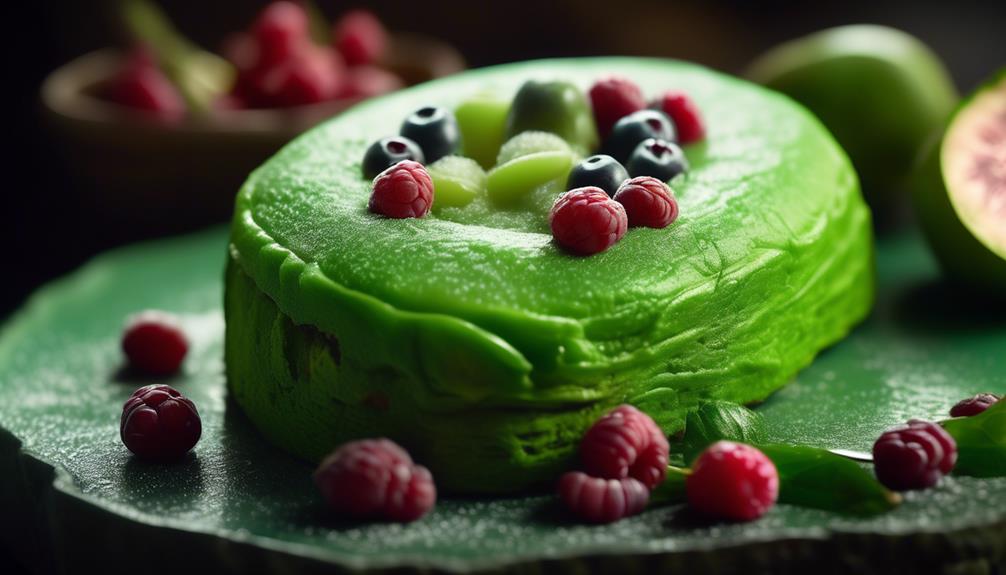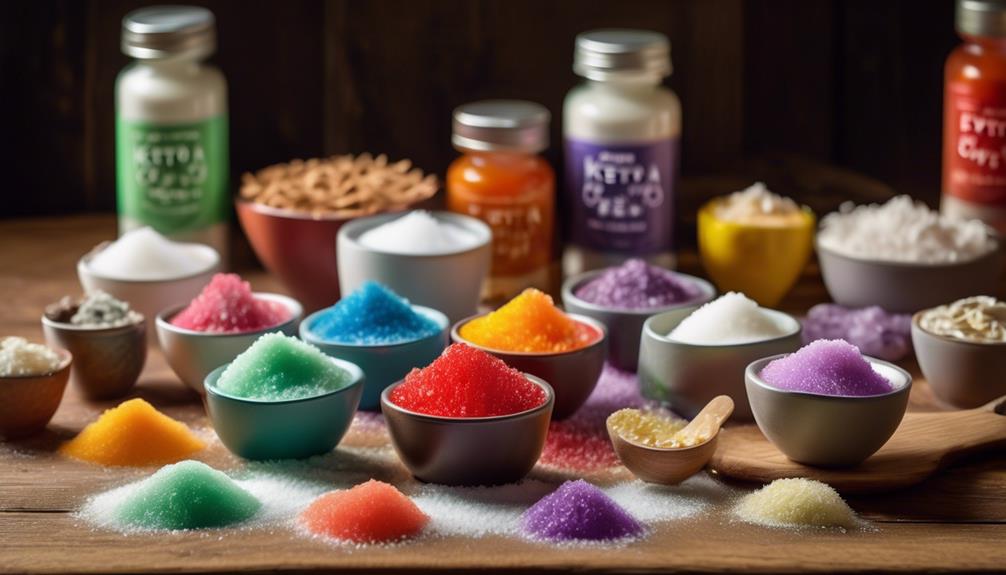Looking to satisfy your sweet tooth while sticking to your keto diet? Wondering what sugar substitutes are best for baking success? Well, have you ever wondered if there are keto-friendly alternatives that can give you the same delicious taste without the guilt?
If so, you're in luck! In this discussion, we will explore the top keto-friendly sugar substitutes that will make your baked goods taste just as sweet, without derailing your diet.
So, get ready to discover these amazing substitutes that will revolutionize your baking experience and leave your taste buds craving for more.
Erythritol

Erythritol, a keto-friendly sugar substitute, is a versatile ingredient that can enhance the sweetness of your baked goods without impacting your blood sugar levels. When it comes to baking recipes with erythritol, there are several pros and cons to consider.
One of the main advantages of erythritol is its low calorie content. With only 0.2 calories per gram, it's a great option for those who are watching their calorie intake. Additionally, erythritol doesn't raise blood sugar levels, making it suitable for individuals with diabetes or those following a ketogenic diet.
Another benefit of erythritol is its similarity in texture and taste to sugar. Unlike some other sugar substitutes, erythritol doesn't leave a bitter aftertaste. It also retains its sweetness when exposed to high temperatures, making it ideal for baking.
However, there are a few downsides to using erythritol as a sugar substitute. Some people may experience digestive issues such as bloating or diarrhea when consuming large amounts of erythritol. Additionally, erythritol can have a cooling effect in the mouth, which may not be preferred by everyone.
Stevia
Stevia, a natural sweetener derived from the leaves of the stevia plant, is a popular choice for those looking to reduce their sugar intake while still enjoying a touch of sweetness in their baked goods. Stevia has gained attention for its potential health benefits and its ability to provide sweetness without adding calories or carbohydrates.
Here are some key benefits of using stevia in your baking:
- Zero calories: Stevia is a non-nutritive sweetener, meaning it provides sweetness without adding any calories to your baked goods. This makes it an excellent option for those watching their calorie intake.
- Low glycemic index: Stevia has a minimal impact on blood sugar levels, making it suitable for individuals following a low-carb or ketogenic diet. It can be a valuable tool for managing diabetes or controlling sugar cravings.
- Intense sweetness: Stevia is incredibly sweet, often described as being 200-400 times sweeter than sugar. This means you can use much less stevia compared to sugar in your recipes, making it a cost-effective option in the long run.
- Heat stable: Stevia is heat stable, which means it can be used in baking without losing its sweetness. Unlike artificial sweeteners, stevia doesn't break down at high temperatures, allowing you to enjoy delicious sugar-free treats.
When comparing stevia to other sweeteners like erythritol, it's important to consider personal preferences, taste, and baking goals. While erythritol may be more similar to sugar in terms of taste and texture, stevia offers the advantage of being calorie-free and having a lower glycemic index. Experimenting with different sweeteners can help you find the perfect balance of sweetness and health benefits in your baked goods.
Monk Fruit

To continue exploring sugar substitutes for baking, let's now focus on the subtopic of Monk Fruit.
Monk Fruit, also known as Luo Han Guo, is a small green fruit native to Southeast Asia. It has been used for centuries in traditional Chinese medicine for its numerous health benefits.
Monk fruit is gaining popularity as a natural sweetener due to its zero-calorie content and its ability to provide sweetness without raising blood sugar levels.
One of the main benefits of monk fruit is its intense sweetness. It's estimated to be about 100-250 times sweeter than regular sugar, allowing you to use a smaller amount while still achieving the desired sweetness in your baked goods. Additionally, monk fruit doesn't have a bitter aftertaste like some other sugar substitutes, making it a pleasant option for those with a sensitive palate.
When it comes to monk fruit sweetener options, you can find it in various forms such as liquid extracts, powdered extracts, and granulated blends. These options allow you to easily incorporate monk fruit into your baking recipes. However, it's important to note that monk fruit sweeteners may vary in terms of taste and potency, so it's advisable to experiment and find the one that suits your preferences.
Xylitol
Xylitol is a sugar substitute that offers several health benefits. It has a low glycemic index, which means it doesn't cause a spike in blood sugar levels.
When baking with xylitol, keep in mind that it has a slightly different sweetness compared to regular sugar, so you may need to adjust the amount used in your recipes.
Additionally, it's important to note that xylitol can have a cooling effect in the mouth, which some people may find unpleasant.
Health Benefits of Xylitol
With its numerous health benefits, xylitol has become a popular sugar substitute in baking. It not only provides a sweet taste but also offers several advantages for your dental health. Here are some key benefits of xylitol:
- Reduces the risk of tooth decay: Xylitol inhibits the growth of harmful bacteria in the mouth, preventing them from sticking to the teeth and causing cavities.
- Stimulates saliva production: Chewing xylitol-sweetened products promotes saliva production, which helps neutralize acids and remineralize tooth enamel.
- Does not raise blood sugar levels: Xylitol has a low glycemic index, making it suitable for those following a keto or low-carb diet.
- Recommended daily intake: The American Dental Association recommends consuming 6 to 10 grams of xylitol per day to achieve its dental benefits.
Incorporating xylitol into your baking can't only satisfy your sweet tooth but also contribute to better oral health. Remember to consume it in moderation and consult your dentist for personalized recommendations.
Baking Tips With Xylitol
Enhance your baking creations with the use of xylitol, a versatile sugar substitute with numerous benefits. When baking with xylitol, it's important to follow specific recipes and techniques to ensure success.
Xylitol can be used in a variety of baked goods, including cookies, cakes, and muffins. To achieve the best results, it's recommended to use a one-to-one ratio when substituting xylitol for regular sugar. However, keep in mind that xylitol doesn't have the same properties as sugar, so some adjustments may need to be made to achieve the desired texture and taste.
It's also important to note that xylitol can have potential side effects, such as digestive issues and an increase in blood sugar levels for some individuals. Therefore, it's advisable to consume xylitol in moderation and listen to your body's response.
Happy baking!
Comparing Xylitol to Other Sugar Substitutes
When comparing xylitol to other sugar substitutes, it's important to consider factors such as taste, texture, and potential health effects.
Xylitol, a natural sweetener derived from fruits and vegetables, has gained popularity for its benefits in oral health. Here is how xylitol stacks up against other natural sweeteners for keto diets:
- Xylitol: Known to reduce the risk of tooth decay and promote oral health, xylitol has a similar taste and texture to sugar, making it an excellent substitute for baking.
- Erythritol: This sugar alcohol has zero calories and doesn't affect blood sugar levels. However, it may cause digestive issues in some individuals.
- Stevia: Derived from the stevia plant, stevia is a calorie-free sweetener. However, it can have a bitter aftertaste and may not provide the same browning effect in baked goods.
- Monk Fruit: With zero calories and a low glycemic index, monk fruit extract is a natural sweetener that can be used in baking. It's important to note that it may be more expensive than other alternatives.
When choosing a sugar substitute for your keto diet, consider your taste preferences and any potential health effects. Remember to always use these sweeteners in moderation.
Allulose
Allulose, a keto-friendly sugar substitute, can be a great addition to your baking repertoire. Not only does it provide sweetness without the added carbs and calories, but it also offers several health benefits.
Allulose is a naturally occurring sugar found in small quantities in certain fruits, such as figs and raisins. Unlike regular sugar, it isn't metabolized by the body and doesn't raise blood sugar levels, making it suitable for those following a ketogenic diet or managing diabetes.
One of the health benefits of allulose is its low calorie content. It contains only 0.4 calories per gram, compared to regular sugar's 4 calories per gram. This makes it an excellent option for individuals looking to reduce their calorie intake while still enjoying sweet treats. Additionally, allulose has been found to have a minimal impact on blood glucose and insulin levels, making it a safe choice for diabetics.
When using allulose in baking, there are a few tips to keep in mind. First, it's important to note that allulose isn't as sweet as regular sugar. Therefore, you may need to use slightly more allulose to achieve the desired level of sweetness in your recipes. It's also worth mentioning that allulose doesn't caramelize like regular sugar, so it may not provide the same browning effect in baked goods. However, it can still contribute to the texture and moisture of the final product.
Inulin

Inulin, a versatile prebiotic fiber, is another excellent sugar substitute to consider for your keto-friendly baking endeavors. Not only does it provide a sweet taste, but it also offers several health benefits.
Here's what you need to know about using inulin as a sugar substitute and incorporating it into your keto baking recipes:
- Inulin vs. other keto-friendly sweeteners:
- Inulin is a natural sweetener derived from plants, making it a healthier option compared to artificial sweeteners.
- It has a low glycemic index, meaning it doesn't cause a significant spike in blood sugar levels.
- Inulin is also a prebiotic fiber that promotes the growth of beneficial gut bacteria, supporting digestive health.
- Using inulin in no-bake desserts:
- Inulin can be used as a sugar substitute in no-bake desserts like cheesecake or energy bites.
- Its slightly sweet taste adds flavor without adding unnecessary carbs or calories.
- Inulin can help create a creamy texture in desserts, similar to the mouthfeel of sugar.
When using inulin in your keto-friendly baking, it's essential to follow the recommended guidelines for substitution. Experiment with different quantities to achieve the desired level of sweetness. Remember, moderation is key, even with low-carb sweeteners. Enjoy the benefits of inulin while satisfying your sweet tooth in a healthy way.
Swerve
If you're looking for another versatile sugar substitute for your keto-friendly baking, consider trying Swerve. Swerve is a popular sweetener among those following a ketogenic diet because it provides the taste and texture of sugar without the negative effects on blood sugar levels. One of the benefits of Swerve is that it contains zero calories and zero net carbs, making it an ideal choice for those on a low-carb or keto diet. It's made from a combination of erythritol and oligosaccharides, which are derived from fruits and vegetables.
Swerve is also known for its ability to mimic the taste and texture of sugar in baking. It measures cup-for-cup like sugar, making it an easy substitute in recipes. Whether you're making cookies, cakes, or muffins, Swerve can be used as a replacement for sugar in equal amounts.
In addition to its baking versatility, Swerve is also diabetic-friendly. Unlike sugar, Swerve doesn't cause spikes in blood sugar levels, making it a suitable option for those with diabetes or insulin resistance.
If you're interested in trying Swerve in your keto baking, there are many recipes available online that incorporate this sugar substitute. From chocolate chip cookies to cheesecake, there are endless possibilities for creating delicious treats while staying true to your ketogenic lifestyle.
Yacon Syrup

Yacon syrup is a natural sweetener that can be a great option for those following a keto diet due to its low glycemic index and potential health benefits. Derived from the roots of the yacon plant, it has a sweet taste similar to caramel or molasses. Here are some reasons why you should consider using yacon syrup in your keto-friendly dessert recipes:
- Low Glycemic Index: Yacon syrup has a low glycemic index, which means it doesn't cause a rapid increase in blood sugar levels. This makes it a suitable choice for those who need to manage their blood sugar levels while enjoying sweet treats.
- Natural Sweetness: Yacon syrup is a natural alternative to sugar that can add sweetness to your desserts without the added calories and carbohydrates. It can be used in various recipes like cakes, cookies, and even homemade ice cream.
- Potential Health Benefits: Yacon syrup contains inulin, a type of dietary fiber that acts as a prebiotic and promotes healthy gut bacteria. It may also help improve digestion, support weight loss, and reduce cholesterol levels.
- Versatile and Easy to Use: Yacon syrup can be easily incorporated into your keto baking recipes. It can be used as a direct substitute for sugar, or you can adjust the amount depending on your desired sweetness level.
Conclusion
In conclusion, when it comes to keto-friendly sugar substitutes for baking, options like erythritol, stevia, monk fruit, xylitol, allulose, inulin, swerve, and yacon syrup can be great alternatives. These substitutes offer a variety of tastes and textures while keeping your blood sugar levels in check.
So, why not give them a try and satisfy your sweet tooth without derailing your keto diet? Remember, the choice is yours, but don't miss out on these extraordinary options that can elevate your baking experience to new heights.







